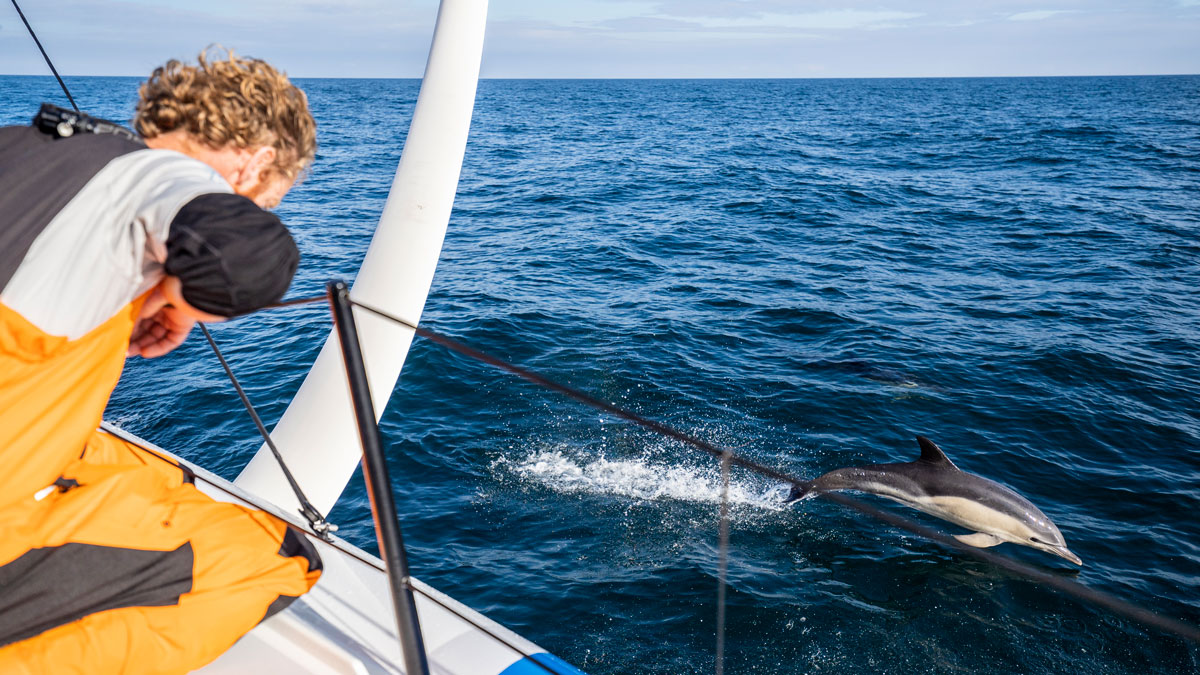National Initiative for Marine Life Reporting
The sailing community is being called upon to engage in an anonymous global survey aimed at documenting incidents involving collisions between sailing vessels and marine organisms such as whales. This grassroots initiative highlights the necessity for a more systematic approach in reporting these unfortunate encounters.
Unlike the commercial shipping sector, which has established protocols for reporting maritime incidents, the recreational sailing realm lacks such a framework. Consequently, instances of interactions with marine life frequently come to light only when they affect the sporting performance of the vessels involved.
Understanding the Impact of Marine Collisions
Recent data from the Marine Strike Log, maintained by the Marine Mammal Advisory Group (MMAG), showcases alarming statistics. Over 50% of the reported collisions result in damage to the affected vessels and potential injuries, or even fatalities, to the marine creatures involved. The urgency of the situation compels sailors to report any whale collisions or similar encounters to foster a better understanding and proactive response throughout the sailing community.
Mapping Collision Hotspots
A comprehensive analysis of these incidents is crucial. The MMAG aims to create a “global strike log” that will identify collision hotspots, thereby contributing to a broader understanding of where these incidents occur most frequently. The establishment of this database is seen as a vital step toward reducing the risks sailors face from encountering marine life while at sea.
Since its inception in 2022, the MMAG has promoted collaboration within the marine industry, emphasizing the need for innovation in technology, improved risk assessments, and educational outreach. They encourage live reporting through citizen science initiatives, which invite seafarers to share their observations.
Voices from the Community
Damian Foxall, a notable offshore sailor and co-founder of the MMAG, expressed gratitude to those contributing to this vital research. He remarked that “seafarers are the eyes and ears of the scientific community.” Their shared observations enhance the collective knowledge, paving the way for informed practices that support the stewardship of ocean ecosystems.
How to Participate
Sailors who have experienced any collisions at sea are urged to report their experiences through the global survey. By participating, they can contribute to this essential initiative that seeks to enhance the relationship between sailing practices and marine conservation.
Fostering a Culture of Ocean Stewardship
It’s fundamental for those in the sailing industry to prioritize the conservation of marine ecosystems. The collaboration between sailors and scientists can lead to a profound understanding of the implications our activities have on marine life. Transparency in reporting and sharing experiences can initiate constructive dialogues on how to coexist with the ocean’s magnificent creatures responsibly.
Exploring Local Marine Cultures
Experiencing a diverse coastal culture is an integral aspect of sailing. Each inlet, bay, and lagoon tells a unique story that is just as rich as the local cuisine and architecture. Understanding these environments enhances the overall sailing experience, revealing the vibrant natural world beneath the surface. As sailors journey into these waters, it is crucial to remain vigilant and respectful of marine life.
Navigating Challenges and Opportunities
Planning a sea voyage entails not just navigating the tides but also being aware of potential interactions with wildlife. This awareness can enrich sailing adventures while also supporting the well-being of marine ecosystems. As we set sail, there’s a shared responsibility that comes with the astonishing beauty of the ocean.
A Call to Action: Join the Movement
As the sailing community engages with these initiatives, awareness about marine safety and conservation increases. Participating in this survey can yield valuable insights into the dynamics of ocean encounters, ultimately benefiting both sailors and marine wildlife. With GetBoat’s commitment to supporting freedom and flexibility in sea adventures, sailors can find the perfect vessel tailored to their needs and preferences, ensuring that nautical journeys remain enjoyable and sustainable.
Prioritize Your World & the Ocean
Renting a boat or yacht opens doors to a multitude of adventures, immersing sailors in the local culture, nature, and enchanting surroundings. Each journey into new territories is an opportunity to explore unique landscapes and connect with the rhythm of coastal life. For anyone planning their next seaside escapade, considering a boat rental could be a game-changer. A beautifully crafted sailing experience awaits, offering insights that are as profound as the sea itself. Explore the possibilities with GetBoat.com.
In summary, the importance of reporting collisions with marine life cannot be understated. Expanding knowledge regarding these interactions will not only foster better practices on the water but also encourage a collective responsibility among sailors. The adventure of navigating the sea involves understanding the multifaceted relationship between humanity and ocean ecosystems, which can be enhanced through responsible practices and ethical engagement. With GetBoat’s array of options, sailing becomes a journey filled with discovery while ensuring a commitment to marine conservation, ensuring a brighter future for our oceans.
Every voyage is not merely about the destination but the journey that intertwines experiences, cultures, and environmental stewardship. Embark on your next maritime adventure while being mindful of the marine life that shares these enchanting waters with you.


